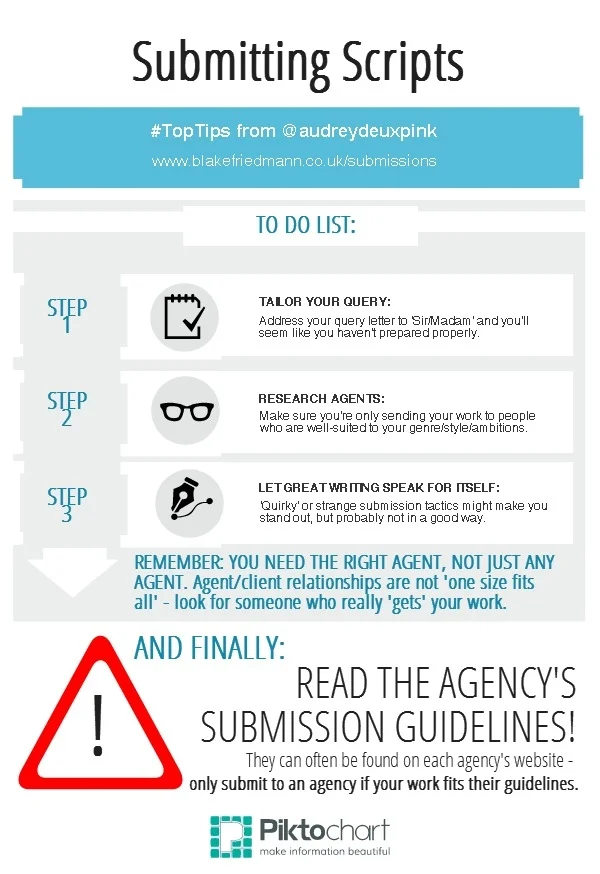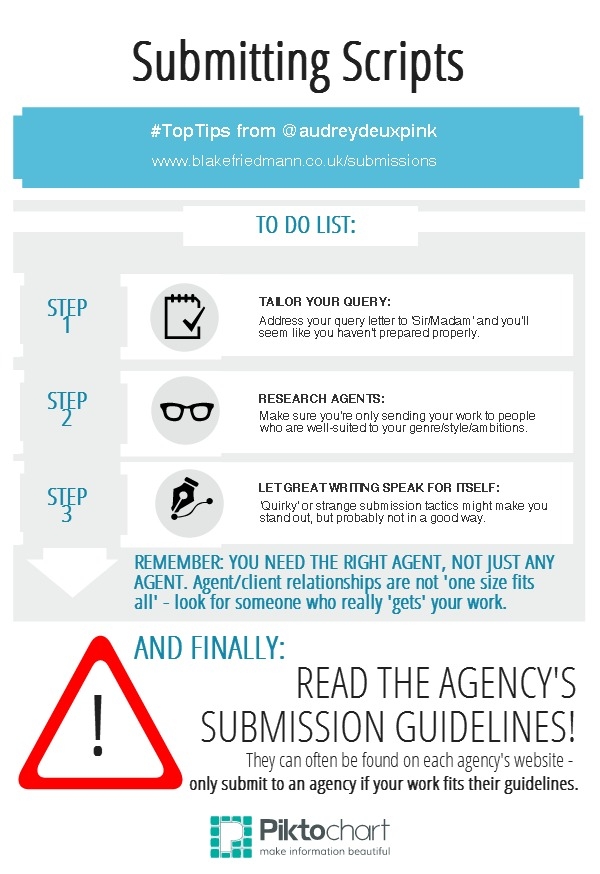Partly inspired by a twist on Richard Charkin's recent talk and his 'Don'ts for Publishers', we've turned this on its head and instead put together a list of ‘Agents Don't…’, intended to debunk some common myths about agents, or help explain how and why we agent!
Agents Don't…
1. Publish your books. We seek a publisher for your book, and ensure your work is in the hands of a great editor and their team of marketers, publicists, digital experts and sales people.
2. Earn anything until you do. We work on a commission basis, so we only get paid when our authors do! This ensures that it's in everyone's best interests to take a book that's in the most appealing shape possible, to publishers, and why we might spend a lot of time honing your manuscripts and proposals before they go out on submission to editors.
3. Know the tastes of other agents. Strange to admit, but other agents are either our friends, our competition or both! We might know them socially, and know a little of their list of authors, but when it comes down to it representing a book is a personal business and we don't always know what floats another agent's boat. So that’s why we are very rarely able to recommend other agents if we turn your book down. Agency websites are most helpful; go and look at an agent's list and their bio, for the best information on what they're looking for.
4. Have any time to read during office hours. It's a common fallacy that we're to be found at our desks, feet propped on stacks of manuscripts, thumbing through our authors' newest deliveries and reading at our leisure. I WISH. Sadly there is no time to read during the day; we're busy negotiating deals and the resulting contracts, chasing payments and checking royalty statements, forwarding requests for our authors' appearances at festivals and events, meeting editors and listening to what they're looking for, liaising with publicity and marketing teams, catching up with colleagues on sending out our books for translation and media sales, and pursuing potential new authors. Very occasionally we might be able to squeeze some editing in on a Friday afternoon, but usually all reading (and editing) is done outside work hours.
5. Have the time to reply to submissions with detailed feedback. Unfortunately we simply don't have enough hours in the day to feedback our thoughts on your three chapters or proposal. And, if we want to be businesslike about it, it’s not in our interests to spend time editing a book we’re not going to work with! However, if we think a book is good enough to consider despite its flaws, or that it could be very interesting to us after a good edit, we will always say so. Equally, if the writer has talent but this book is not for us, we’ll say so. And no book comes to us in perfect shape!
6. Appreciate rude or persistent writers, whether that's someone calling up the agency reception at regular and increasingly agitated intervals, or barging in on a conversation at a Fair or Festival. We know you're anxious to hear from us and, trust us, if you've a great book or idea then we will definitely be in touch. However, if you've a great book but have been rude to our receptionist or in chasing emails, we won't want to work with you. Polite and professional is the best way for us both to be!
7. Choose brand over book. It has to begin with a great novel or book idea, not just with one hundred million followers on Twitter (however helpful that might be further down the line!). Writers seem to worry a lot these days about their ‘profile’, and it can’t be denied that this is a concern to publishers sometimes too. However, we all need to be convinced that there’s a good, publishable book in whoever we represent (we would always hope that there are many good, publishable books ahead for an author), so the best introduction to us and to a publisher is with a winning idea and strong writing. Not every single author we work with is social-media savvy. I’d personally recommend using Twitter as it’s a LOT of fun and a brilliant place for talking to other writers and sharing writing experiences, as well as a valuable peek into the publishing industry via agents and editors, but it’s not essential.
8. Give up on an author after just one book. As mentioned above, we usually take on an author with a view to them having a long and fruitful career. This is why good writing is important; you could have one great idea, but then… nothing. But if you’re a good writer then we’ll keep chatting with you about potential new book ideas. And if your first book doesn’t sell, we’ll talk to you about pursuing something else. We’re in it for the long term!
9. Chase trends. Because a) we couldn’t possibly predict them (who saw FIFTY SHADES coming? Pardon the unintentional filthy pun) and b) we couldn’t keep up – most books benefit hugely from several months of editing, marketing and publicity, by which time the reading public is going crazy for the next trend: whatever happened to vampires?
10. Go to lunches and parties just for the free booze. Yes, we know there is the popular belief that we are carousing every night, quaffing cheap party wine and canapes, but actually we go to these kind of social events (much less so now than a decade ago, too) to fit in catching up with editors and their colleagues, hearing about what they’re publishing and using these friendly occasions as an opportunity to pitch our books. And if we can munch a tiny quiche whilst we talk about our fantastic authors, so much the better.
11. Have to read just their own authors’ manuscripts and the submissions pile, but also a wide variety of newly-published books to keep up with competitors and publishing tastes. I try to cram in one non-‘work’ book per weekend, so I’m up-to-date with the books that are appealing to editors and readers alike. Why did everyone rave about The Fault in Our Stars? Best way to find out is to read it…
12. Only make deals. It’s all about career planning and thinking strategically, looking ahead to try and shape an author’s career in the long term. We’re also sounding boards for our writers, who might come to us with new ideas and their plans for their futures; we maintain a continuous conversation about how we’re going to develop an author and their books, and how best to get them to where they want to be. This is becoming especially important in an ever-evolving publishing landscape, with new platforms, formats and models to explore with our authors.
13. Like telling their clients about rejections. It hurts the agent too: they’ve taken the client on because they admire and love their work, and have a genuine and unswerving belief that a book should be published. Rejections are rubbish for everyone, and don’t get any easier!
14. Exist in a vacuum. We’re all actually human (strange as it might seem) and while reading and editing seeps into every moment of our supposedly spare time, we do occasionally have to have time off, do something else, to maintain perspective. (I don’t think we ever REALLY switch off, but a bit of fresh air can do wonders for new inspiration…) Just as writers are advised to put a book to one side for a little while once they’ve finished the first draft, in order to edit with a bit of new perspective, we all benefit from a break.
15. Sit behind our desks ignoring submissions, feeling superior or polishing our keys to the gates of publishing. (In short: take everything you read about publishing in the newspapers or similar, with a LARGE pinch of salt.) We're desperate to find good books and great authors; we comb our submissions pile as frequently and as thoroughly as we can, and are always happy to meet new writers, whether on Twitter or IRL. It's important for us to be accessible and excitable! And we never get bored of finding that next incredible book.



